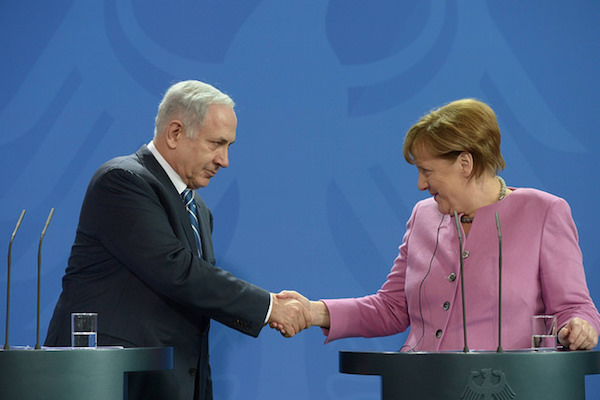From surreal exaggerations to outright lies, Netanyahu dished up another batch of nonsense utterings to a foreign audience in Berlin this week. We picked three of the best and broke them down for you.

Prime Minister Benjamin Netanyahu has something of a track record of saving his most nonsensical and demonstrably false statements for foreign audiences. Although honesty is also not his strong point on home turf, it’s when he’s speaking in English that he gets really creative.
Less than four months after his bumbling attempt to pin the Holocaust on the Grand Mufti of Jerusalem aroused equal parts derision and mirth (and that wasn’t the only lie he told that month), Netanyahu was at it again on Tuesday during an official visit to Berlin.
“The French initiative … says … if you do not succeed we are already predetermining the result – we will recognize a Palestinian state… It does not matter if this state could become another Islamic dictatorship … [or if parts of it are taken over by] by Daesh or Hamas or both of them.”
This is pure Bibi patois: a lot of rambling about doomsday scenarios while putting words in his opponent’s mouth in order to make them seem hopelessly unaware of the apocalyptic reality on their doorstep, and at the same time undermining the very premise of the initiative. (Cf. when Bibi took on the West over Iran.)
Netanyahu took care, as he has done since the last Gaza war, to mention Islamic State and Hamas in the same breath, before getting tangled up in a Dick Cheney-esque, vaguely metaphysical speculation on why the talks were doomed to fail before they’d even begun. He also seemed to suggest that just by recognizing the State of Palestine (like 136 other countries already have), the French will automatically make a state come forth — which somewhat channels Theodor Herzl and his “if you will it, it is no dream” spirit.
This holds a few functions for Netanyahu. Firstly, it allows him to again cast himself as the visionary leader with unparalleled diplomatic insight and security nous (a role he likes to play at home, too). Secondly, it lays the groundwork for Israel to be able to reject whatever comes out of the initiative, because as we all know, the Palestinians aren’t going to get anything unless Netanyahu is the one graciously giving it to them.
And thirdly, it allows him to once more cast Israel as the underdog, frozen out of the party and moreover when they’re the ones with the most to lose, no matter what happens.
“Israel doesn’t arrest journalists.”
Netanyahu made this statement after being told during his press conference in Berlin that the Israel Police had detained two Washington Post journalists for absolutely no reason whatever (originally billed as “incitement”), and then released them.
As these words were coming out of Netanyahu’s mouth, Palestinian journalist Mohammed al-Qiq was in a hospital bed, dying after 84 days on hunger strike in protest at his ongoing administrative detention at the hands of the Israeli authorities.
Israel has arrested several other journalists over the last couple of years alone on spurious or unequally-applied grounds (i.e. they don’t apply to Jewish Israelis), including Majd Kayyal, Amin Abu Wardeh and Bilal Tamimi, who was arrested alongside two Israeli photographers.
Going a few years further back, Israel also arrested Israeli journalist Uri Blau for saying things that the government didn’t want him to, which brings us onto Bibi’s next point.
“The press in Israel is free to say anything it wants.”
Netanyahu tends to coast on autopilot when telling foreigners how free and democratic Israel is. He is so fluent in hasbara (as are all Israeli politicians and functionaries who address international audiences), and so intent on portraying the country as a shimmering, liberal utopia that even inescapable facts of life about the Israeli media environment such as gag orders and military censorship fail to smash the bauble.
Gag orders, which tend to be sweeping and leave the media reporting on major incidents in an odd, almost comically nondescript way, can cover everything from terror attacks to arrests in high-profile criminal investigations and more, and Israeli journalists receive such gag orders all the time. Gag orders can last for days, months or years. Journalists may or may not be able to report whether there is a gag order at all.
The Military Censor’s office, meanwhile, can take its magic wand to any element of any article it deems to have security information that’s a little too sensitive. When this occurs not only is the press not free to say anything it wants, it’s also not free to tell its readers that it’s not free to say anything it wants.
But none of that presents Israel as the beacon of enlightened democracy that Bibi is so desperate for people to think that it is. So he tells a different version of events.

